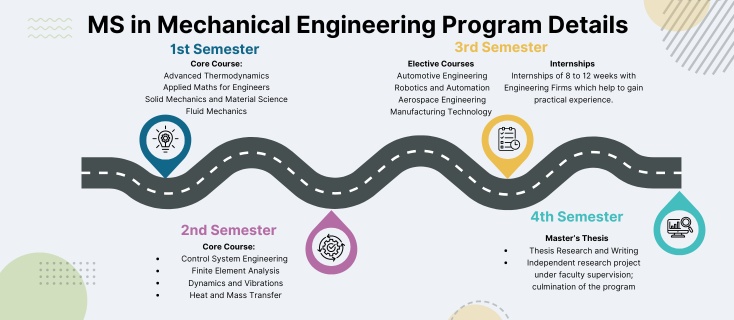There are more than 400 higher education institutions in Germany. Additionally, over 20% of all engineering students are studying Mechanical Engineering. A Master’s in Mechanical Engineering in Germany means that not only will one have access to an excellent education system, but it also opens the way for studying at institutions like the Technische Universität München(TUM), and the RWTH Aachen University, which is always among the top 50 engineering schools in the world.
Only in 2023, over 40,000 foreign students were enrolled in various engineering programs in Germany, most of which were based on its good reputation for excellence, innovation, and strong industry ties. With a low competitive tuition fee of €500 per year at public universities and living expenses ranging from €8,000 to €12,000 per annum, Germany offers an affordable and quality path to becoming a mechanical engineer.
Why choose MS in Mechanical Engineering in Germany
- Germany is known as a global leader in Engineering. Germany’s strong industrial base and robust industrial foundation include over 6,000 mechanical engineering firms generating more than €226 billion in yearly revenue.
- Germany’s emphasis on new ideas and tech makes it an ideal spot for students who want to deepen their understanding in this area. Recent data shows that almost 25% of all foreign students in Germany sign up for engineering courses making it one of the top choices for study.
- Masters in Mechanical Engineering in Germany is considered a top choice because you get to work with some of the leading engineering companies like Mercedes-Benz, Volkswagen, BMW, and other popular engineering firms.
Admission Requirements for MS in Mechanical Engineering Germany
Below down are the admission requirements to get entry into the best universities for MS in Mechanical Engineering in Germany:
| Requirements | Description |
| Educational Background | Bachelor’s Degree in Mechanical Engineering.Minimum GPA 2.5-3.0 on a scale of 4.0, typically around 80% marks in the bachelor’s degree. |
| APS Certification | To study in Germany, APS is a mandatory thing. Transcripts and Degree evaluation through the German Embassy. |
| Entrance Exam | A good GRE score is advantageous for admission into top-tier universities. |
| Letters | Statement of Purpose Letter of RecommendationLetter of MotivationLetters of ReferenceInternships LetterWork Experience Letters |
| Visa and Financial Evidence | Students Visa Blocked Account (approximate 11,000 per year) amount |
| Other Important Documents | Medical InsuranceCV/ ResumePassport CopyPassport Sized PhotoProof of Application Fee Payment |
| Language Requirements | English-Taught Programs: IELTS: Minimum 6.5-7.0 TOEFL: Minimum 90-100 German-Taught Programs: TestDaF: Level 4 DSH: Level 2 or 3 Goethe Zertifikat C1/C2 |
Also Check: Business Analytics Masters in Germany
Cost of Study
Compared to most countries, studying for a Mechanical Engineering Masters in Germany is relatively less expensive. Not only is the cost of living but a rich experience of life will also be experienced by the individuals. Accommodation, tuition fees, transportation fees, and food expenses are some major expenses that every individual has to bear in Germany. Here is an estimate of the expenses that any international student has to bear to pursue an MS in Mechanical Engineering in Germany:
| Component | Cost Estimate Range (per year) | Additional Information |
| Tuition fees | €500 – €3,000 | It varies between Public Universities and Private Universities. If the University is Public, then there is no need to pay tuition fees. |
| Semester contribution | €150 – €350 | In most of the Public Universities semester contribution is added to the tuition fees. |
| Health Insurance | €80 – €100 | Health Insurance is mandatory. |
| Accommodation | €200 – €700 | Expected to see high rent in big cities, Accommodation would be Students Dorms, Hostel, and Private Rentals, it depends upon you what accommodation you choose. |
| Living Expenses | €700 – €1,000 | Living Expenses include Food, transportation, Books Study Material, and other personal Expenses. |
Also Read: Aerospace Engineering in Germany Fees
Best Universities for MS in Mechanical Engineering in Germany
Germany has some of the top Universities that provide a full 2-year program in MS in Mechanical Engineering. These universities are well-ranked worldwide and students get the full exposure to advance their skills in Mechanical Engineering.
In this table here are the best universities for Mechanical Engineering Masters in Germany, their type, their global engineering rank, and the key features are mentioned below:
| University Name | Type | Global Engineering Rank | Key Features |
| Technical University Munich (TUM) | Public | 20th | Strong industry connections with companies like BMW and Siemens |
| RWTH Aachen University | Public | 27th | Offers 30+ mechanical engineering specializations; 9 research centers |
| Technical University Berlin | Public | 43rd | Focus on interdisciplinary research; strong partnerships with global tech firms |
| Karlsruhe Institute of Technology (KIT) | Public | 36th | Known for innovation in engineering; extensive alumni network in top |
| Leibniz University Hannover | Public | 52nd | Attractive location; strong emphasis on research; advanced facilities offered for robotics and automation studies |
| Technical University of Darmstadt | Public | 58th | Cutting-edge research in sustainable energy and materials science |
| Friedrich-Alexander-Universität Erlangen-Nürnberg(FAU) | Public | 60th | Offers unique specializations in mechatronics and production engineering. |
| Ruhr University Bochum | Public | 64th | Applied research with industrial partners from the Ruhr region |
| TU Dresden | Public | 49th | Research in aerospace engineering; cooperates with Airbus |
Also Read: Btech Universities in Germany
Jobs after done Mechanical Engineering Masters in Germany
After completing MS in Mechanical Engineering in Germany, graduates have a number of opportunities in the market to show their skills and get high-paying job roles. Students can work in different sectors like Automotive, Aerospace, Manufacturing, and Robotics.
Demand for Mechanical Engineers is always high, not only in Germany but in different countries also.
| Job Roles | Average Salary per year(€) | IN rupees(₹) |
| Mechanical Engineer | €50000- €75000 | ₹44,00,000 – ₹66,00,000 |
| Automotive Engineer | €55000- €80000 | ₹48,40,000 – ₹70,40,000 |
| Aerospace Engineer | €60000- €85000 | ₹52,80,000 – ₹74,80,000 |
| Research and Development Engineer | €55000- €80000 | ₹48,40,000 – ₹70,40,000 |
| Mechanical Design Engineer | €50000- €70000 | ₹44,00,000 – ₹61,60,000 |
| Project Manager | €60000- €90000 | ₹52,00,000 – ₹79,20,000 |
Fees for Master’s in Mechanical Engineering in Germany
Fees for Mechanical Engineering in Germany are comparatively affordable than in other countries. One of the most attractive features of studying masters in mechanical engineering in germany for indian students is that the cost to study there is relatively less, more so in public universities Public Universities charge zero tuition fees, they only charge semester contributions. The semester’s contribution is somewhere around 350 euros.
And Fees in Private Universities are higher than in Public Universities.
| Public Universities | Private Universities |
| Average tuition fees range from €500 up to €3,000 per year in the majority of public universities. | At private universities, the amount can escalate to highs of €10,000 to €20,000 every year. |
| The actual amount of tuition is almost non-existent; thus, it is close to zero, since they usually retain a nominal amount for administrative purposes. | This could be because they offer quite specialized programs and facilities compared to public institutions |
| The average approximate cost estimation per year can go from €1,500 to €5,350, which is required for tuition fees, semester contributions, and other minimum living expenses. | The cost for those attending private institutions can rise, for example, from €12,000 to €25,000 per year, including all tuition and living expenses. |
MS in Mechanical Engineering in Germany: Program Detail and Duration
An MS in Mechanical Engineering in Germany is a 2 years full-time program. First-year core courses are studied to strengthen the foundation. In 2nd year students can choose electives according to their interests. Core courses are mandatory and provide the framework of subjects that a course in mechanical engineering should provide.

Here is the detailed breakdown of the program :
First Year
First-year contains 2 semesters (Semester 1) and (Semester 2)
| Semester 1 | Semester 2 |
| Core Course:Advanced ThermodynamicsApplied Maths for EngineersSolid Mechanics and Material ScienceFluid Mechanics | Core Course:Control System Engineering Finite Element AnalysisDynamics and VibrationsHeat and Mass Transfer |
| Laboratory Courses that complement theoretical courses. | Attend Seminars and Project Work |
Second Year
Second year contains 2 semesters (Semester 3) and (Semester 4)
| Semester 3 | Semester 4 |
| In the third semester, students choose their specialization. Elective Courses Automotive EngineeringRobotics and AutomationAerospace EngineeringManufacturing Technology | Masters Thesis Independent research work under the supervision of professors of the universities. |
| Internships of 8 to 12 weeks with Engineering Firms which help to gain practical experience. |
Conclusion
Pursuing an MS in Mechanical Engineering in Germany is an investment in your future. Get the Opportunity to work with leading companies to get experience in one of the most traveled places in the world. Studying in Germany would be considered the best decision of the life.
An education expert specializing in German higher education could be of help by providing the right personal guidance and support all through. They really do offer great insights and support so that the transition to your studies in Germany is smooth and successful.
Successcribe helps from free counseling, and university selection to language preparation, visa support, and accommodation assistance, all the services available in one platform.
So, what are you waiting for? Start your study abroad journey with Successcribe.
Related Post
MS in Electrical Engineering in Germany
MS in Biomedical Engineering
Masters in Psychology in Germany
MS in Chemical Engineering













